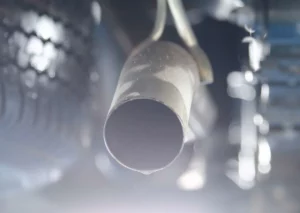The Unsung Hero of Performance: Understanding Your Vehicle’s Exhaust System
 The exhaust system, often overlooked, is a critical component of your vehicle. It does more than just expel exhaust gases; it plays a pivotal role in engine performance, fuel efficiency, and even emissions control. In this blog post, we’ll shine a spotlight on the exhaust system, exploring what it does, its components, common issues, and the importance of professional auto service for maintaining this essential part of your vehicle.
The exhaust system, often overlooked, is a critical component of your vehicle. It does more than just expel exhaust gases; it plays a pivotal role in engine performance, fuel efficiency, and even emissions control. In this blog post, we’ll shine a spotlight on the exhaust system, exploring what it does, its components, common issues, and the importance of professional auto service for maintaining this essential part of your vehicle.
The exhaust system serves several crucial functions:
- Exhaust Gas Removal
It safely directs harmful exhaust gases away from the engine and vehicle cabin. - Noise Reduction
The system includes mufflers and resonators that reduce engine noise. - Emissions Control
Catalytic converters within the exhaust system help reduce harmful emissions. - Backpressure Regulation
Proper backpressure is essential for engine performance and efficiency. - Fuel Efficiency
A well-maintained exhaust system contributes to better fuel economy.
Components of the Exhaust System
The exhaust system is composed of several key components:
- Exhaust Manifold
Collects exhaust gases from the engine’s cylinders. - Catalytic Converter
Reduces harmful emissions by converting pollutants into less harmful substances. - Muffler
Quiets the exhaust noise by creating sound-canceling waves. - Resonator
Further reduces noise and fine-tunes exhaust sound. - Exhaust Pipe
Transports gases from the manifold to the rear of the vehicle. - Oxygen Sensors
Monitor oxygen levels in the exhaust for fuel mixture adjustments.
Common Exhaust System Issues
Over time, the exhaust system can develop problems that require attention. Common issues include:
- Exhaust Leaks
Corrosion or damage can lead to leaks, affecting performance and safety. - Catalytic Converter Failure
A failing converter can result in poor emissions and decreased performance. - Muffler or Resonator Damage
Deterioration can lead to increased noise levels. - Excessive Backpressure
Blockages or restrictions in the exhaust can reduce engine efficiency. - Oxygen Sensor Malfunction
Faulty sensors can lead to poor fuel economy and increased emissions.
Why Professional Auto Service Matters
Professional auto service is essential for maintaining and repairing your exhaust system due to several reasons:
- Expertise
Skilled technicians have the knowledge to diagnose and repair exhaust issues accurately. - Diagnostic Tools
Auto shops use specialized tools for exhaust system diagnostics. - Quality Parts
Reputable providers use high-quality replacement components for lasting performance. - Emissions Compliance
Professional service ensures your vehicle complies with emissions regulations. - Safety
A well-maintained exhaust system prevents harmful exhaust gases from entering the cabin. - Performance Optimization:
Proper service can enhance engine performance and fuel efficiency.
The exhaust system may be an unsung hero, but it’s undeniably vital for your vehicle’s performance, efficiency, and safety. Recognizing common exhaust system issues and the role of professional auto service in maintaining this critical component is essential. By entrusting your exhaust system to experts, you’re ensuring that your vehicle operates quietly, efficiently, and in compliance with emissions regulations. So, the next time you hear a change in your vehicle’s exhaust note or notice reduced fuel efficiency, consider it a cue to visit a professional auto service provider and give your exhaust system the attention it deserves. Your vehicle’s health—and the environment—will thank you for it.











